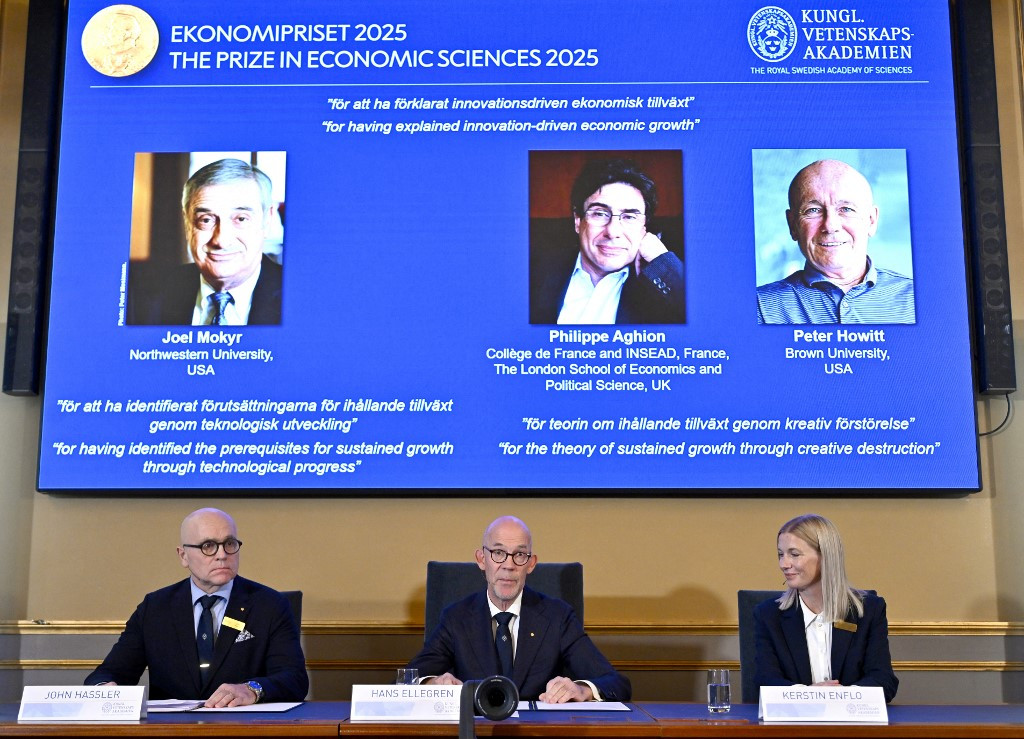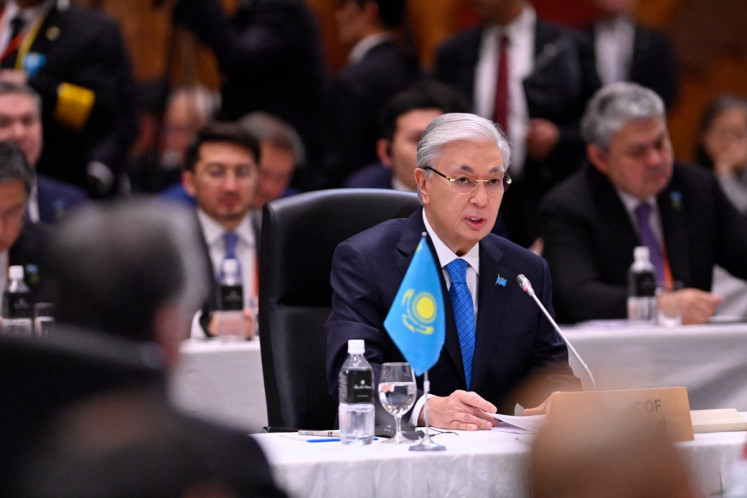Popular Reads
Top Results
Can't find what you're looking for?
View all search resultsPopular Reads
Top Results
Can't find what you're looking for?
View all search resultsTrio win Nobel economics prize for work on innovation, growth and 'creative destruction'
While most economists view economic growth as a driver of prosperity, there are some who do not see it as an unalloyed good.
Change text size
Gift Premium Articles
to Anyone
 John Hassler, Chair of the Committee for the Prize in Economic Science in Memory of Alfred Nobel, the Secretary General of the Royal Swedish Academy of Sciences Hans Ellegren and Kerstin Enflo, member of the Committee for the Prize in Economic Sciences in Memory of Alfred Nobel (left to right) sit in front of a screen displaying the portraits of the 2025 prize winners (left to right) Joel Mokyr, Philippe Aghion and Peter Howitt, as they addresses journalists during the announcement of the winner of the 2025 Nobel Prize in Economics, the Sveriges Riksbank Prize in Economic Sciences in Memory of Alfred Nobel, at the Royal Swedish Academy of Sciences in Stockholm, Sweden, on October 13, 2025. The Nobel prize in economics was awarded to American-Israeli Joel Mokyr, France's Philippe Aghion and Canada's Peter Howitt for work on technology's impact on sustained economic growth. (AFP/Anders Wiklund)
John Hassler, Chair of the Committee for the Prize in Economic Science in Memory of Alfred Nobel, the Secretary General of the Royal Swedish Academy of Sciences Hans Ellegren and Kerstin Enflo, member of the Committee for the Prize in Economic Sciences in Memory of Alfred Nobel (left to right) sit in front of a screen displaying the portraits of the 2025 prize winners (left to right) Joel Mokyr, Philippe Aghion and Peter Howitt, as they addresses journalists during the announcement of the winner of the 2025 Nobel Prize in Economics, the Sveriges Riksbank Prize in Economic Sciences in Memory of Alfred Nobel, at the Royal Swedish Academy of Sciences in Stockholm, Sweden, on October 13, 2025. The Nobel prize in economics was awarded to American-Israeli Joel Mokyr, France's Philippe Aghion and Canada's Peter Howitt for work on technology's impact on sustained economic growth. (AFP/Anders Wiklund)
J
oel Mokyr, Philippe Aghion and Peter Howitt won the 2025 Nobel economics prize on Monday for their work on how innovation and the forces of "creative destruction" can drive economic growth and lift living standards across the globe.
Their research explains how technology gives rise to new products and production methods which replace old ones, resulting in a better standard of living, health and quality of life.
The Royal Swedish Academy of Sciences, which awards the prize, said the laureates had also shown that such progress cannot be taken for granted.
"Economic stagnation, not growth, has been the norm for most of human history. Their work shows that we must be aware of, and counteract, threats to continued growth," the Academy said.
The prize winners themselves highlighted challenges from US President Donald Trump's trade policies and his administration's higher education reforms which are considered by some as an attack on academic freedom.
Mokyr warns of US scientific own goal
While most economists view economic growth as a driver of prosperity, there are some who do not see it as an unalloyed good.
The 2024 Economics prize was won by Daron Acemoglu, Simon Johnson and James Robinson for work on inequality and Johnson in particular has pointed to how the benefits of technological innovation can be skewed toward powerful elites.
There is also a fierce debate about what level of growth is sustainable in light of man-made climate change and environmental degradation.
The prestigious award, formally known as the Sveriges Riksbank Prize in Economic Sciences in Memory of Alfred Nobel, is the final prize to be given out this year and is worth 11 million Swedish crowns ($1.2 million).
Mokyr, a professor at Northwestern University in the United States, was awarded half the prize.
An Israeli-American, Mokyr said he had been up very early to see the news of the return of Israeli hostages from captivity in Gaza. "I had forgotten about the Nobel Prize completely," he told Reuters.
His research looks at "why we are so much richer and live so much better than our great-great-grandfathers", he said, adding he was worried that the US may lose its place at the vanguard of scientific research and education under President Trump.
"The current administration's assault on higher education and scientific research may be the biggest own-goal in history, or at least the biggest self-goal since the Ming Dynasty in China essentially prohibited scientific research and exploration," he told Reuters.
"It is self-destructive and is completely driven by irrelevant politics."
The Trump administration says the US is the largest funder of scientific research in the world and that its measures will cut waste and promote innovation.
Aghion, a professor at the College de France and INSEAD in Paris and at the London School of Economics and Political Science, and Howitt, a professor at Brown University in the United States, shared the other half of the prize.
Aghion says tariffs are obstacles to growth
The award comes at a potential inflexion point for the global economy with many expecting artificial intelligence to spark a new growth spurt.
It also highlights the strategic risks for Europe of falling further behind the United States and China in the technologies of the future.
Aghion said de-globalization and tariff barriers were "obstacles to growth" adding that the bigger the market the more possibilities to exchange ideas, transfer technologies and for healthy competition.
"Anything that gets in the way of openness is an obstacle to growth. So I see there kind of dark clouds currently accumulating, pushing for barriers to trade and openness," he said.
Aghion called on Europe to learn from the US and China, which he said have found ways to reconcile competition and industrial policy.
"In Europe, in the name of competition policy, we became very anti any form of industrial policy. I think we need to evolve on that and find ways to reconcile industrial policy in areas like defense, climate, AI, biotech," he said.
Howitt questions returning manufacturing jobs to US
Howitt, who said he had been "absolutely stunned" by the award, was also critical of President Trump's trade policies.
"It's pretty clear that these are going to discourage innovation by reducing what we call the scale effect," he told Reuters. "Starting a tariff war just reduces the size of the market for everybody."
He said that trying to bring manufacturing jobs back to the US could perhaps make some political sense but was not good economic policy.
"We're good at designing running shoes, but it's best for us to leave others to make them," he said.
The Nobel prizes for medicine, physics, chemistry, peace and literature were announced last week.
The Economics prize was first handed out in 1969.
While few economists are household names, relatively well-known winners include former US Federal Reserve chairman Ben Bernanke, and Paul Krugman and Milton Friedman.









